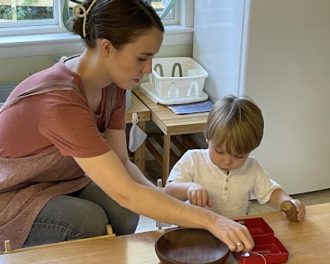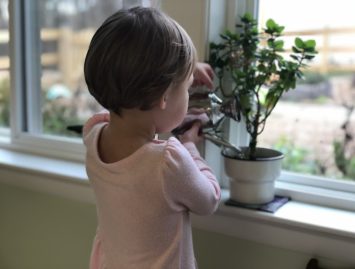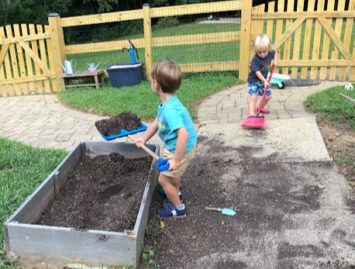


The Young Children's Community
CMS has two Young Children’s Communities that provide environments rich with experiences. These experiences encourage physical, emotional, and social development that lead to independence, confidence, self-knowledge, and intellectual growth. Classrooms are intentionally designed to serve the needs of 18 month to 36 month old children, who are constantly urging, “show me how to do it by myself!”
Through the guidance of one trained teacher and one assistant, children in the YCC work to develop spoken language, develop and refine gross and fine motor skills, and learn about self care and care of the classroom environment. In addition, grace and courtesy, which are the keys to successful socialization, are integrated through all parts of the school day. This classroom work builds confidence, concentration, and a sense of self.
Children begin their day outside, greeting friends, climbing on logs, sitting in a hammock, digging in the sand, or simply strolling with a classmate. These activities, guided by the teacher and encouraged by the mixed-age peer group, are designed to activate the child’s natural tendency toward big work at this age. Children are innately driven to run, to jump, to climb, to crawl, to dig, and to develop their gross motor movements. There is also much language to be acquired and practiced outdoors. Children hunt for insects, discover different colors and plants, hear and see birds, and engage in work in all kinds of weather. There are so many, many things to discover and discuss, independently, in peer groups, and in lessons with the teacher.
The child’s day continues as they move into the indoor classroom environment for their morning work period. First, children remove outdoor shoes and put on indoor shoes, which live at school. This built-in practice at self-sufficiency develops confidence while also preparing the child for inside work.
Within the classroom, children continue to acquire new language via formal lessons with the teacher and informal interactions with mixed-age peers. The adults always offer clear, correct, and precise language with consistent volume and tone. As conflict arises, it is embraced as a way to practice the grace and courtesy required to avoid it or to easily move through it in the future.
Children will also explore paints, sewing, or collage work as a way of self-expression. Food preparation develops concentration and encourages independence through self-care. Self-confidence also emerges when a child is able to serve to friends the muffins which they helped prepare the previous day!
Toilet independence is a big work for any child of this age. The process towards toilet independence begins with all children wearing cotton underpants throughout the day. A set routine of bathroom visits encourages success as does a nonchalant attitude toward wet clothing – it is simply time to move to the bathroom and change into dry clothing.
With the help and guidance of the adults, children prepare a daily snack. They learn to mix rolls and muffins, peel eggs and clementines, slice cheese and bananas, and so much more. Snack is an opportunity for children to expand their taste buds and to practice the grace of sitting down to a meal with friends. As part of the community work, children set the table with placemats, plates, glasses, and utensils as needed. They serve the food, pour the water, eat together, and then clean up. Independence is encouraged and responsibility is developed.
Both YCC programs meet 5 days per week. You may choose a half-day or a full-day pick-up. Children who stay for the full-day will eat lunch, brought from home, in the classroom. After lunch, low napping cots are placed in the classroom for the afternoon naptime.
The Young Children’s Communities are designed for children to freely discover their potentials through guidance and modeling from adults. As they become more capable, the children continue to explore and to discover their abilities as independent beings. Treated with respect and care, we see each child’s personality naturally emerge.
YCC At A Glance
Location: Main Campus
Enrollment/Class: 10-12 children
Ages served: 18 – 36 months
Staff/Class: 1 AMI-trained faculty and 2 assistants
Daily Schedule
8:15-8:30 AM – Arrival window
8:30-11:00 AM – Morning Work Period
8:30-9:00 AM – Outdoor work
9:00-10:30 AM – Indoor work
10:30-11:00 AM – Group snack
11:00-11:45 AM – Outdoor Work
11:45-Noon – Half-day dismissal
Noon-12:45 PM – Lunch
12:45-2:45 PM – Nap
3:00-3:15 PM – Dismissal window
Poplar Classroom Guide – Kate Mahoney Poplar Classroom Assistant – Ashley Evans
Willow Classroom Guide – Jocelyn Richard Willow Classroom Assistant – Bea Argueta
YCC Support – Crystal Clark

